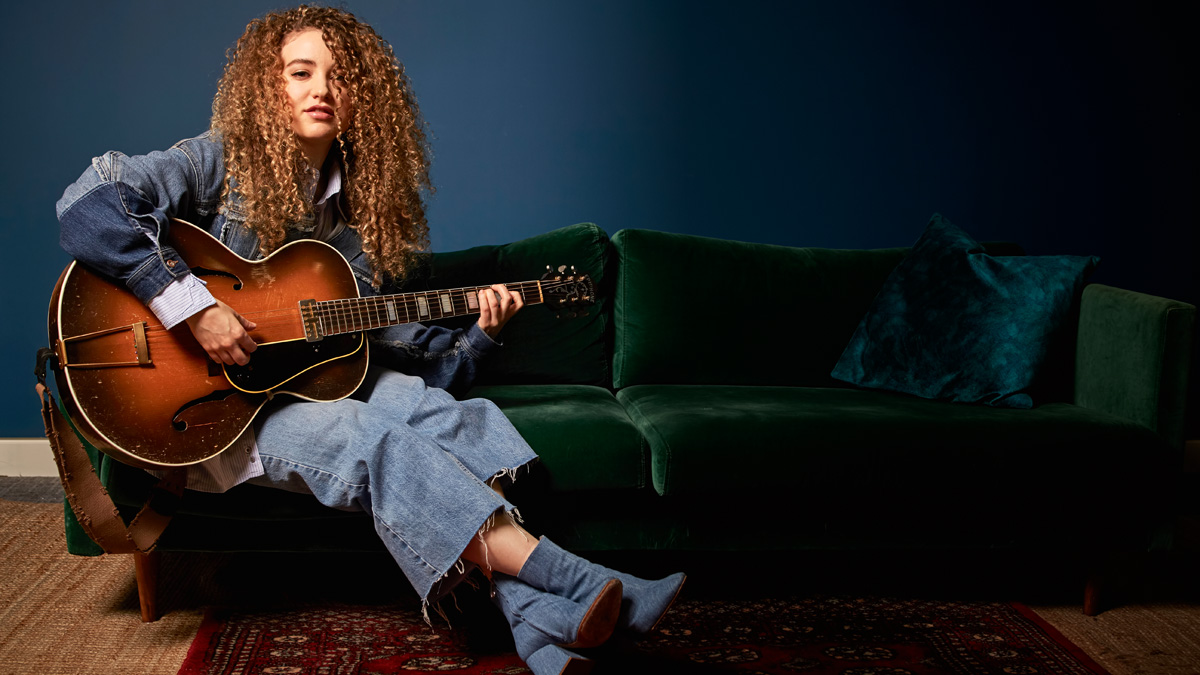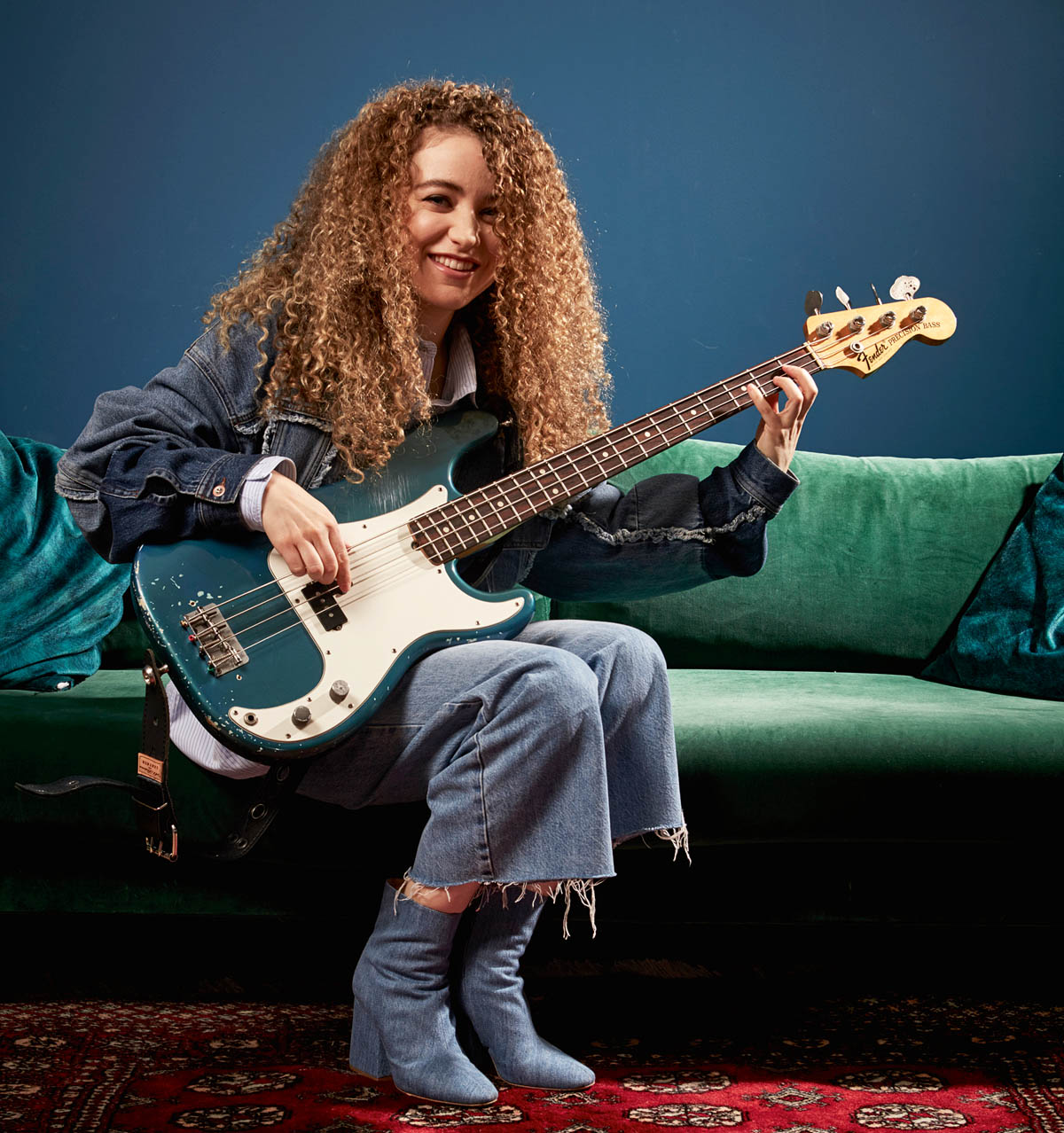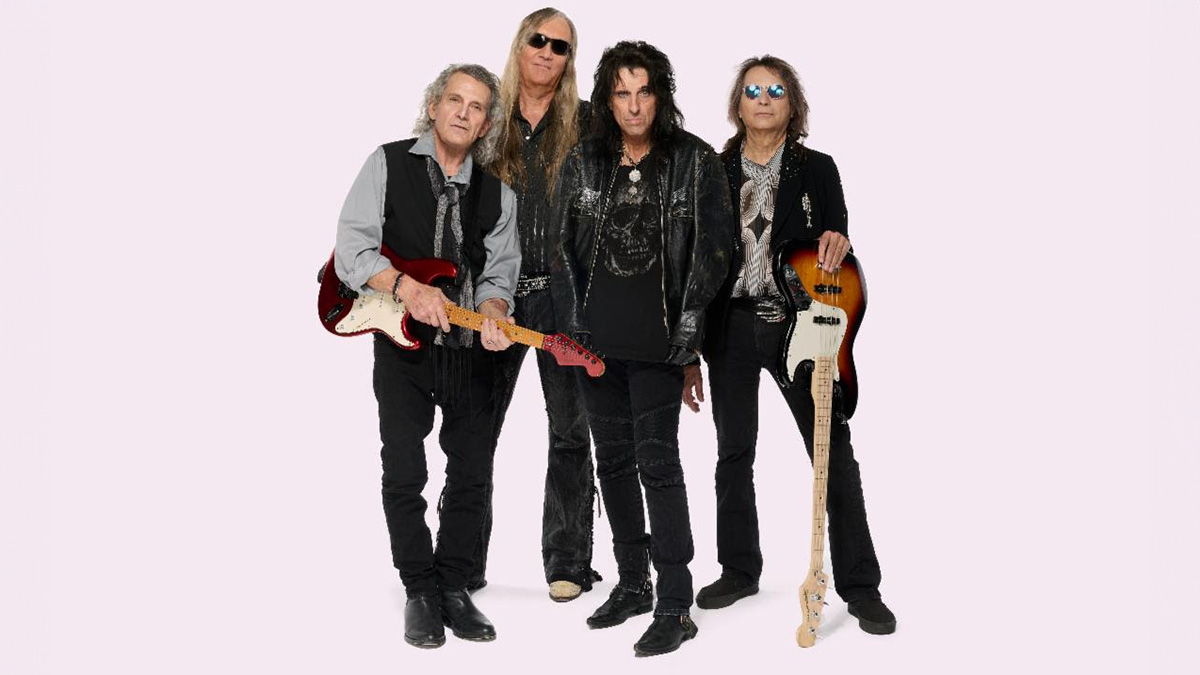Tal Wilkenfeld: "I don’t really think about switching from guitar to bass or vice versa - it’s more about what mindset you’re choosing to be in"
Australian musician Tal Wilkenfeld - known for her work with Jeff Beck, Prince and Herbie Hancock - on her new album and incredible journey so far

"It sounded like fun!” laughs Tal Wilkenfeld on relocating from Australia to America for a career in music at just 16 years old. “Every kid that age just wants to go and explore and feel free. Well, maybe some don’t, but I certainly did...”
It’s a decision that ultimately paid off. After switching from guitar to bass while at the Los Angeles College For Music, she relocated to New York and made a name for herself in its ever-thriving jazz scene, leading to an invitation to jam with The Allman Brothers at Manhattan’s Beacon Theater.
After recording her instrumental fusion debut, Transformation, she would go on to join the bands of virtuoso masters like Jeff Beck, Chick Corea and Herbie Hancock, as well as recording with Prince, Toto and Jackson Browne.
But it’s this year’s long-awaited follow-up record Love Remains that best captures Wilkenfeld’s musicality in full, dazzling glory - blending that keen ear for melody with her soulful voice in a collection of atmospheric rock songs, ranging from the downtuned rumblings of Corner Painter to the ethereal echoes of Under The Sun.
Having played both guitar and bass on the album, talking to Total Guitar inside the London headquarters of her new major label home, she gives us a closer look at the sounds and situations that got her here...
When did you realize this would be a heavier album compared to your debut, sharing more in common with rock luminaries like Jimi Hendrix and Jeff Buckley than the jazz fusion world?
I moved to New York and went on stage with The Allman Brothers, who despite getting called blues or southern, to my ears just play rock ’n’ roll
“I started with rock ’n’ roll. That’s where it all began, listening to Jimi Hendrix at the age of 14. When I moved to America two years later, I was persuaded to investigate other kinds of music.
Get The Pick Newsletter
All the latest guitar news, interviews, lessons, reviews, deals and more, direct to your inbox!
"I got a scholarship on guitar when I was 16, switching to bass six months later. We were encouraged to listen to jazz fusion and things that would help improve technique or how well you know your instrument.
"I got really heavily into it because it’s interesting… Who doesn’t want to get to know their instrument better and find easier communication from brain to fingers to listener? Later, I moved to New York and went on stage with The Allman Brothers, who despite getting called blues or southern, to my ears just play rock ’n’ roll.
"And with Jeff Beck, he’s so prolific he gets called a fusion musician, but he’s still a rock star. I’ve played a lot of rock, with the exception of Herbie Hancock and Chick Corea - those involved different styles of music. Mainly, it’s been rock ’n’ roll with advanced musicians.”
The opening track Corner Painter has a down-tuned grunginess to it. What exactly are we hearing?
“On that I played a Yahama baritone in standard tuning, so with a low B. It was one that Jackson Browne made for me. He took the face off with the help of Bill Asher, one of the guys he works with in LA, and they moved the bridge back with thicker strings.
"They were copying one of the baritone acoustics he has. I wanted this album to be like Jeff Buckley’s Grace - where one minute he’s singing the title track and it all feels really heavy, then he goes into Corpus Christi Carol or Hallelujah, which melts your heart.
"The Beatles had such versatile albums. The people I’ve worked with, like Jeff Beck and Herbie Hancock, go all over the map. Paul Simon explores all these kinds of styles and sounds, he can go in so many different directions, even though his focus is always on the songwriting.”
We heard your vintage 1950s Epiphone archtop was previously owned by Ben Harper...
“When I went in to record the song One Thing After Another, I couldn’t find an acoustic that sounded right. So I went to a guitar store and found a guitar that looked and sounded great. The store knew me so I put my credit card to secure it and took it back with me. It was exactly the right sound for the song.
"I actually returned it, because I wasn’t sure if I was ready to buy it. A few weeks later I called back and they told me, ‘Oh no, we just sold it last night!’ And then they explained it had actually been given back to the owner, so I asked who and they told me Ben Harper.
"I know Ben so I sent him an email after a couple of days saying, ‘Hey, so long story short, I found this great guitar…’ I asked if there was any way I could still buy the guitar and sent him a link to the song. He wrote back saying, ‘Shit! If you had told me 24 hours ago it would have been yours, I literally just sold it!’
"He wasn’t sure if there was any way out of that but he said he’d get back to me. And as the weeks went by, I thought I’d lost it - then I got this email asking for my address because he was going to send me the guitar!”

There are some other altered tunings that give each song its own unique feel...
“One Thing After Another is on the Ben Harper Epiphone with a dropped-D and a capo on the first fret. For Haunted Love, it’s my Sadowsky NYC5 bass tuned to EADGC with a capo on the third fret so I could use open strings ringing through the chords.
"I used an open C# tuning on songs like Love Remains, Pieces Of Me and Under The Sun. Some of it was on this old J45 and one of Jackson’s Gibsons, this CF-100 with a cutaway.”
What kind of amps did you have in the studio?
“Funnily enough, I actually played through guitar amps for most of the album. It was a Music Man and an Ampeg guitar amp. My producer Paul Stacey [Oasis, Steven Wilson], whose brother Jeremy played drums, kept plugging us into all kinds of things until we got a sound we liked, without any rules.
"I never went in thinking we had to use certain things in conjunction for specific things. We just experimented with everything that was there, so it was a really fun process. It’s not even necessarily what I’ll end up doing on the next album, it will depend on what kind of sound I’m going for at that moment in time…”
Stereotypes are broken so much that I don’t even see them now. I don’t really think about switching from guitar to bass or vice versa, it’s more about what mindset you’re choosing to be in
What advice can you offer those who are hoping to switch more easily between guitar and bass?
“You choose a role when you choose an instrument. The instrument doesn’t dictate the role, as much as other people might beg to differ. If you look at a band like The Who, Pete Townshend’s role was more like a bass player, even though he played guitar. It was him holding down the rhythm and the grooves, while their bassist was playing all over the place like a guitarist typically would.
"Stereotypes are broken so much that I don’t even see them now. I don’t really think about switching from guitar to bass or vice versa it’s more about what mindset you’re choosing to be in. In terms of their differences... I really don’t know the answer. Blake Mills played guitar on most of my album and on one song we switched with him on bass and me on guitar. That was what was right for that song.
"Each human will approach the bass or guitar different according to their own senses. We all hear different things in different registers. Whatever I hear on guitar might not work on bass, and in those cases I try something else. It’s more person-to-person than instrument-to-instrument. There’s no limits when you think like that.”
There are some really unusual chord changes in some of the music. What’s your approach when it comes to breaking out of key?
“I always let the melody dictate the chords and the rhythm. I believe that’s why any unusual chord structures or rhythms might sound more natural and less odd - it all follows the melody. I hear it when I listen back to all my favorite old blues recordings, stuff like Lightnin’ Hopkins. Bob Weir (Grateful Dead) told me that people would joke around with Lightnin’ saying he was going to play the 12-and-a-half bar blues.
"It’s not about staying in a box that somebody else has imposed on you, it’s about the story you’re trying to tell. If it takes 12-and-a-half bars, then that’s how many bars this blues will have. You follow the melody. I listen to all my favorite folk songs and they do the same thing...”
Which songs come to mind?
“There’s one by Bob Dylan, It’s Alright Ma (I’m Only Bleeding) and every so often you hear a bar of five in there, just because he had a couple of extra words to say. That’s why it works and doesn’t feel unnatural. I approach my music from the same place.
"What am I saying? What’s the story? What are the chords and rhythms that are going to support that story? If you go from the ground up, starting with the chords or rhythm, you’ve already locked yourself into a different story.
"That’s a different way of making music - I love using it too - but it creates a different result that will be more groove-orientated or set-in-stone. The melody will have less influence because of that. One thing I like to do is let them influence each other all at once. The chords and rhythm can influence the story but it’s a back-and-forth story until you land upon that place where it feels cohesive, natural and true.”
Prince genuinely cared about how music could affect different people
One of your first big breaks was with Jeff Beck. What do you think is the secret behind all that feel?
“He’s a singer! He just sings through his guitar. Just listen to him playing Where Were You... that was always my favorite song in the set. I would just stand there on the side of the stage with my jaw on the floor every time. They were all such fun songs to play.”
Similarly, not many people can say they’ve worked closely with Prince. What was he like to be around?
“He was fun and mysterious. He liked to have long conversations about things, playing devil’s advocate a lot. He was a huge music fan. The very first time he called me, his first question was, ‘Do you like the drum rolls of Jack DeJohnette?’ And I said, ‘Of course!’ to which he replied, ‘Great, we’re going to be friends’. The time after that I went to his house and we took a limo and drove around listening to music.
"He kept asking questions about what I think about different artists; it was nice. He genuinely cared about how music could affect different people and was always looking to grow. He was also very fast in the studio - we recorded to tape and moved very quickly. You might get the chance to punch something but you’d only get one shot at it before moving onto the next thing. I liked that. He wasn’t nitpicky.”
Herbie Hancock and Chick Corea's bands are notorious for improvisation and playing free to various extents. How can musicians get better at thinking on the spot?
“I think being able to play what’s in your head is important. Just sitting with your instrument and hearing something, then executing it. If you stumble to find where it is, then you learn - ultimately increasing your vocabulary and allowing you to step into your own voice instead of somebody else’s. If you do loads of transcribing, you might just end up sounding like the person you’re transcribing.
"I’ve never really done that, I want to expand on what my voice is. Herbie’s actually the one who got me singing. There are no limits, you can go anywhere in his band. It takes a concentrated mind to play jazz. You need to know your theory and a fair few standards to play with other musicians. I went to New York to do it, because it felt like the epicenter of the live jazz scene. So get on a plane and go there, if you want!”
There are so many psychological questions which are directly about music but also inform how you create. You have to ask why yourself why you want to be leading into that emotional space, what is unresolved there?
Once you were there, did the theory side come naturally?
“It’s not that much to learn, to be honest. All you need is some scales and modes, from the major to melodic or harmonic minor. You can get so much out of just the pentatonic scale alone. Then there are other kinds of players like Wayne Krantz, who was one of my favorites, he had this whole mindset about not playing scales and going note-by-note.
"You can dive deep into different things, but eventually you learn it all so you can discard it and not even remember what you’re doing. That’s the place you want to get to.
"People don’t just wake up and are able to talk through their instrument instantly. Although some people can wake up and play anything without knowing any of this information, like Jeff Beck.
"He can play a D7 chord without knowing what one is. He doesn’t think he can count in odd-meters or do any of that stuff, but he plays in odd-meters and over complicated chord changes all the time. Not everyone needs to study, theory is just there for those who can’t initially hear it.”
What advice do you have for guitarists hoping to get better at fingerstyle playing?
“I’ve always played with my fingers on bass it’s ultimately the same thing. I would say a lot of the folk songwriters would be great to learn from, with all that pattern-orientated, chordal finger-picky stuff. Leonard Cohen, for instance, playing that nylon acoustic on Songs from a Room or Songs of Love and Hate sounded so great. He was incredible on those albums.
"It was the three year anniversary of his passing not that long ago. He was one of my biggest inspirations in life. Through him I learned it’s not about focusing on the music, it’s about focusing in on yourself. When you do that, you’ll find so much that you might want to express artistically.”
In that sense, it’s easy to forget about this incredibly personal and introspective side of creativity...
“You have to look inside and think why is this such a difficult situation to understand or why you choose to go down certain harmonic roots. There are so many psychological questions which are directly about music but also inform how you create. You have to ask why yourself why you want to be leading into that emotional space, what is unresolved there? The questions are endless.
"The goal is to get to the place where your choices aren’t coming from a need within you, but rather a bigger picture result. I’m not doing this because I need it, I’m doing this because the music wants to go there. I’m not forcing it to go there. It’s the song leading me, not me leading the song.”
Tal Wilkenfeld's Love Remains is out now via BMG Rights Management.
Amit has been writing for titles like Total Guitar, MusicRadar and Guitar World for over a decade and counts Richie Kotzen, Guthrie Govan and Jeff Beck among his primary influences as a guitar player. He's worked for magazines like Kerrang!, Metal Hammer, Classic Rock, Prog, Record Collector, Planet Rock, Rhythm and Bass Player, as well as newspapers like Metro and The Independent, interviewing everyone from Ozzy Osbourne and Lemmy to Slash and Jimmy Page, and once even traded solos with a member of Slayer on a track released internationally. As a session guitarist, he's played alongside members of Judas Priest and Uriah Heep in London ensemble Metalworks, as well as handled lead guitars for legends like Glen Matlock (Sex Pistols, The Faces) and Stu Hamm (Steve Vai, Joe Satriani, G3).
“When I first heard his voice in my headphones, there was that moment of, ‘My God! I’m recording with David Bowie!’” Bassist Tim Lefebvre on the making of David Bowie's Lazarus
“One of the guys said, ‘Joni, there’s this weird bass player in Florida, you’d probably like him’”: How Joni Mitchell formed an unlikely partnership with Jaco Pastorius











![[from left] George Harrison with his Gretsch Country Gentleman, Norman Harris of Norman's Rare Guitars holds a gold-top Les Paul, John Fogerty with his legendary 1969 Rickenbacker](https://cdn.mos.cms.futurecdn.net/TuH3nuhn9etqjdn5sy4ntW.jpg)





